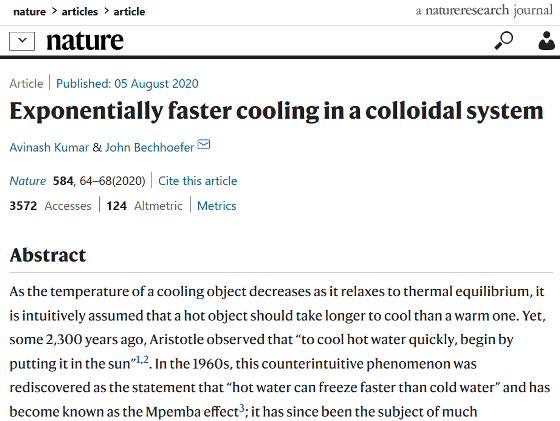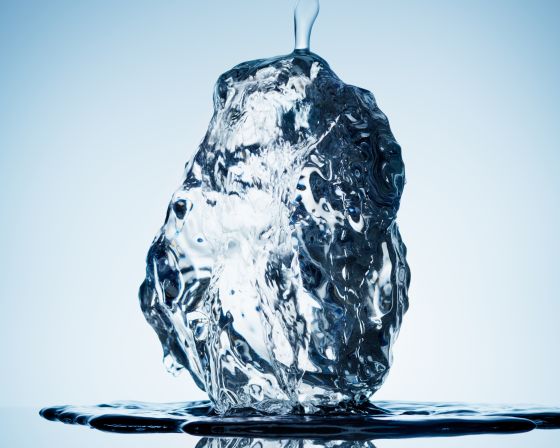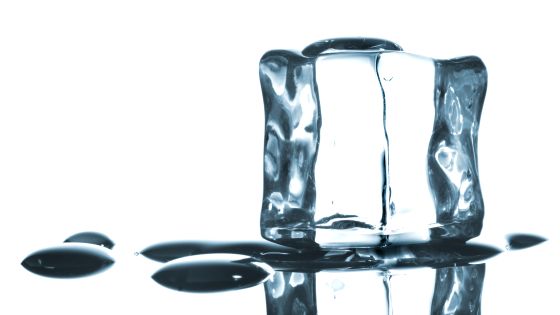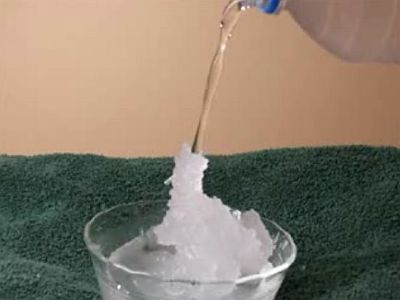The phenomenon that has been debated for about 50 years that 'hot water is easier to freeze than cold water' is demonstrated

The '
Exponentially faster cooling in a colloidal system | Nature
https://www.nature.com/articles/s41586-020-2560-x

A new experiment hints at how hot water can freeze faster than cold | Science News
https://www.sciencenews.org/article/physics-new-experiment-hot-water-freeze-faster-cold-mpemba-effect
The Physics of Why Hot Water Sometimes Freezes Faster Than Cold Water | Smart News | Smithsonian Magazine
https://www.smithsonianmag.com/smart-news/new-experiment-shows-why-sometimes-hot-water-cools-faster-cold-water-180975543/
In 1963, Tanzania's junior high school student, Elasto Mupemba, was practicing making ice cream while freezing a mixture of chilled sugar and milk with a stirring machine. Mr. Mupemba put the liquid, which was still hot, into the stirrer, not the liquid that was chilled, but for some reason, Mr. Mupemba's ice cream was completed earlier than other classmates.
Mmempa, who wondered 'why the hot liquid became easier to freeze?', went to high school and conducted an experiment with the help of physics professor Dennis G. Osbourne, who he met in the lecture. It was In the experiment, boiled water and lukewarm water were put in a cup and frozen, respectively, and it was investigated which one freezes first. As a result, it was discovered that 'hot water freezes more easily than cold water,' and this phenomenon was named the Mupemba effect after Mr. Mupemba's name.
However, since Mr. Osbourne and Mupemba announced that ``hot water is easier to freeze than cold water'' in 1969, there was no way to reliably generate the Mupemba effect, so the authenticity of the Mupemba effect for about 50 years Has been discussed.

The research team of Mr. Kumar et al., who demonstrated the Mupeva effect, was originally experimenting with ``how a glass of a size close to a single molecule of water moves in water under various conditions'' instead of the Mpeva effect. .. While cooling water in the experiment, the research team discovered that 'high temperature glass cools faster than low temperature glass'.
Physicists have divided the definition of 'freezing' of the Mupemba effect in the opinion that 'water reaches below freezing point', 'water begins to freeze', and 'completely freezes', and components such as minerals contained in water. It has been said that it is difficult to demonstrate the effect of the Mupemba because the difference in the speed of freezing also makes a difference.
In the experiment of Kumar and others, by focusing on the temperature change of the glass, the elements of “definition of freezing” and “difference in water component” that make it difficult to study the Mupeva effect were removed, and in the “water freezing process” Instead, we focus on the “water cooling process” and define the Mupeva effect. By following the temperature change until the glass was cooled in water, it became clear that the glass with a high initial temperature cools faster than the glass with a low temperature, and the temperature decreases exponentially. It has also been shown that in about 1000 trials, hot glass cools about 10 times faster than cold glass.

Beckhofer says at Physics World that the experimental system that his research team conducted was 'an image of the Mupeva effect in an almost geometric and abstract way.'
Related Posts:
in Science, Posted by darkhorse_log







